“Is it a difficult hike?” we asked our guide, Tony, from our Ijen Blue Flame Tour the night before our trip to Ijen Crater.
*This post may contain affiliate links, as a result, we may receive a small commission (at no extra cost to you) on any bookings/purchases you make through the links in this post. As an Amazon Associate, we earn from qualifying purchases. Read our full disclosure
“Very steep, yes, but you go up at night, so you can’t see how steep it is,” he responded with a cheeky smile on his face.
After a long day of hiking up, down, and around Mt. Bromo the day prior, our bodies weren’t all that excited to wake up at 1 am to commence our hike to the Ijen Plateau.
The Ijen Plateau
Ijen Plateau, known as “Kawah Ijen“, is a volcano complex located in East Java and is regarded as one of the unmissable sights in Indonesia.
Traveling Soon? Here is a list of our favourite travel providers and accessories to help get you ready for your upcoming trip!
Ijen Crater, Java, IndonesiaThe 20 km (12.5 miles) wide complex, is located in a caldera, a very large crater created by a massive eruption millenniums ago. It provides the perfect conditions for coffee growing along the base of the current volcanoes.
Mount Ijen
Mount Ijen (aka Ijen volcano) is a quiet but active volcano. It is set amidst a stunning landscape of volcanic cones. The beautiful turquoise coloured sulphur lake that resides at the heart of Ijen volcano is the largest acidic lake in the world and the result of a volcanic crater.
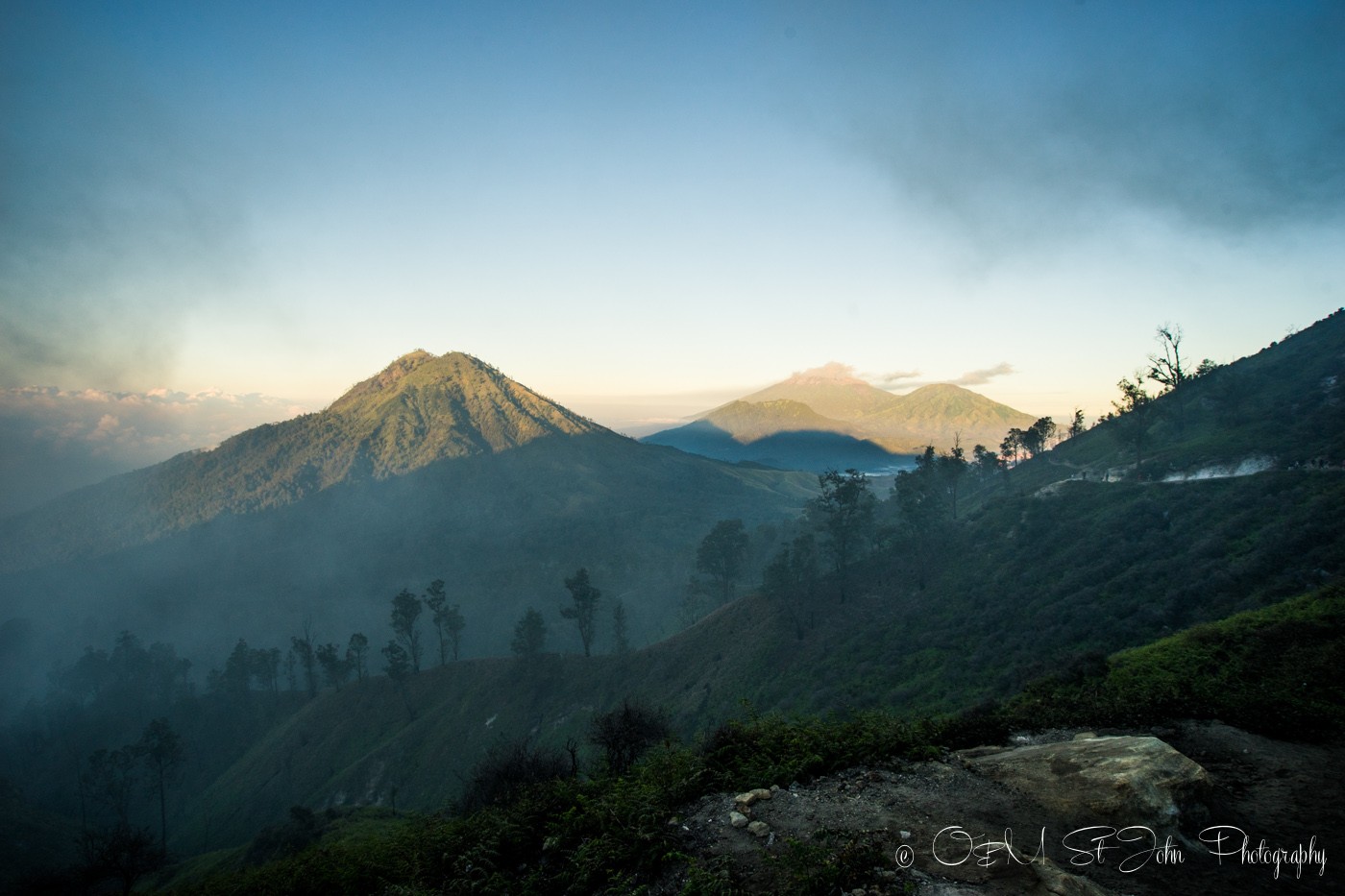
The last magma eruption at Ijen volcano took place in 1871. The eruption jostled its crater lake, which resulted in the lake overflowing, and creating a mudslide which destroyed many villages in the vicinity.
Since then only phreatic eruptions or stream eruptions have taken place. Although in 1997, the colour of the lake changed slightly and appeared to bubble for a short time, no magmatic eruption occurred at Mount Ijen.
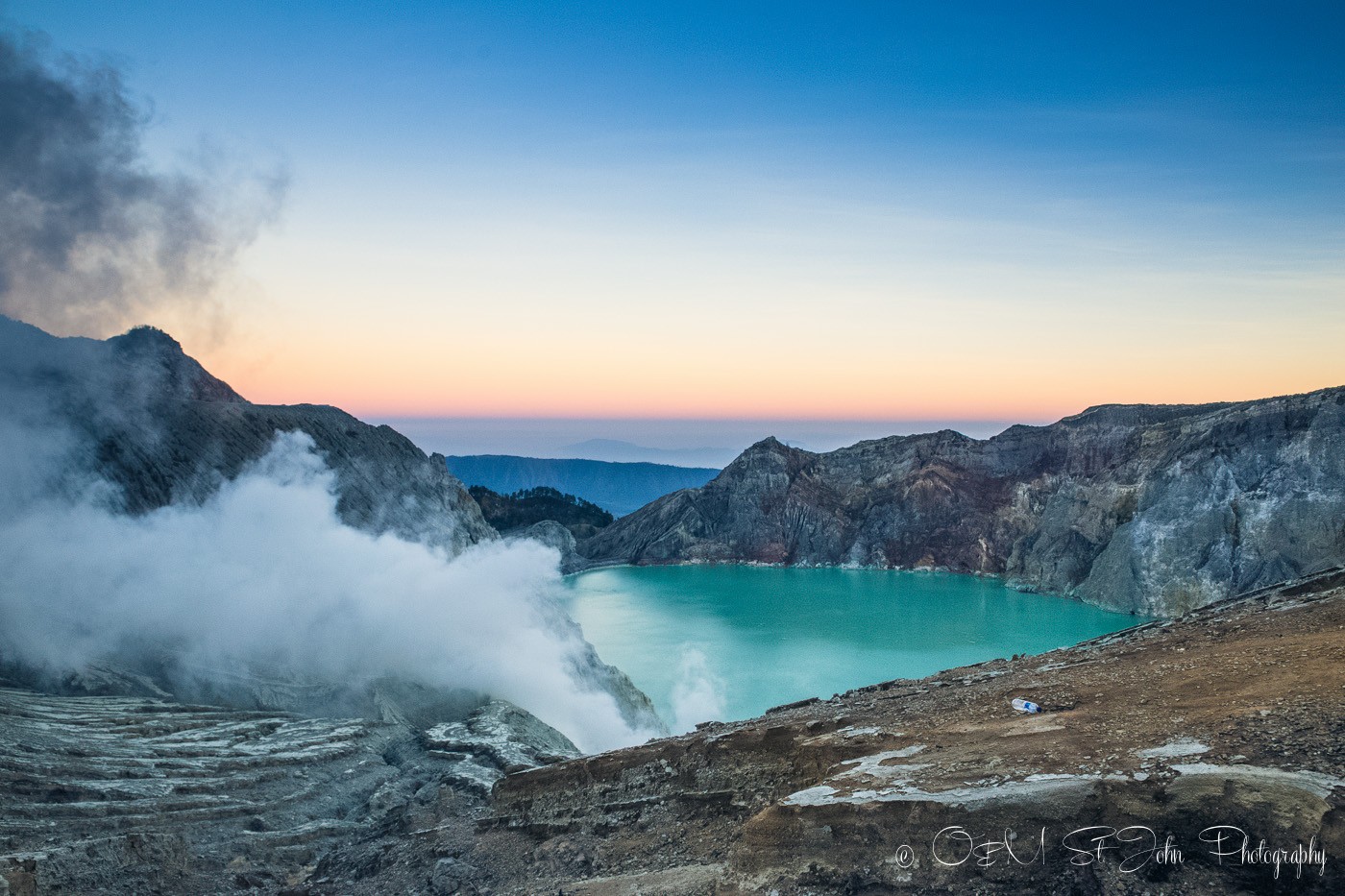
But that’s not the only attraction that makes Ijen, Indonesia famous…
The Ijen Blue Fire
Travelers, us included, flock to Ijen for what’s known as the “Ijen Blue Fire”. An electric-blue flame that appears from the combustion of sulfuric gases. The gases emerge from cracks in the volcano at high pressure and temperature of up to 1,112°F (600°C). Igniting when they come in contact with air. The Ijen blue flames can reach up to 16 feet (5 meters) high.
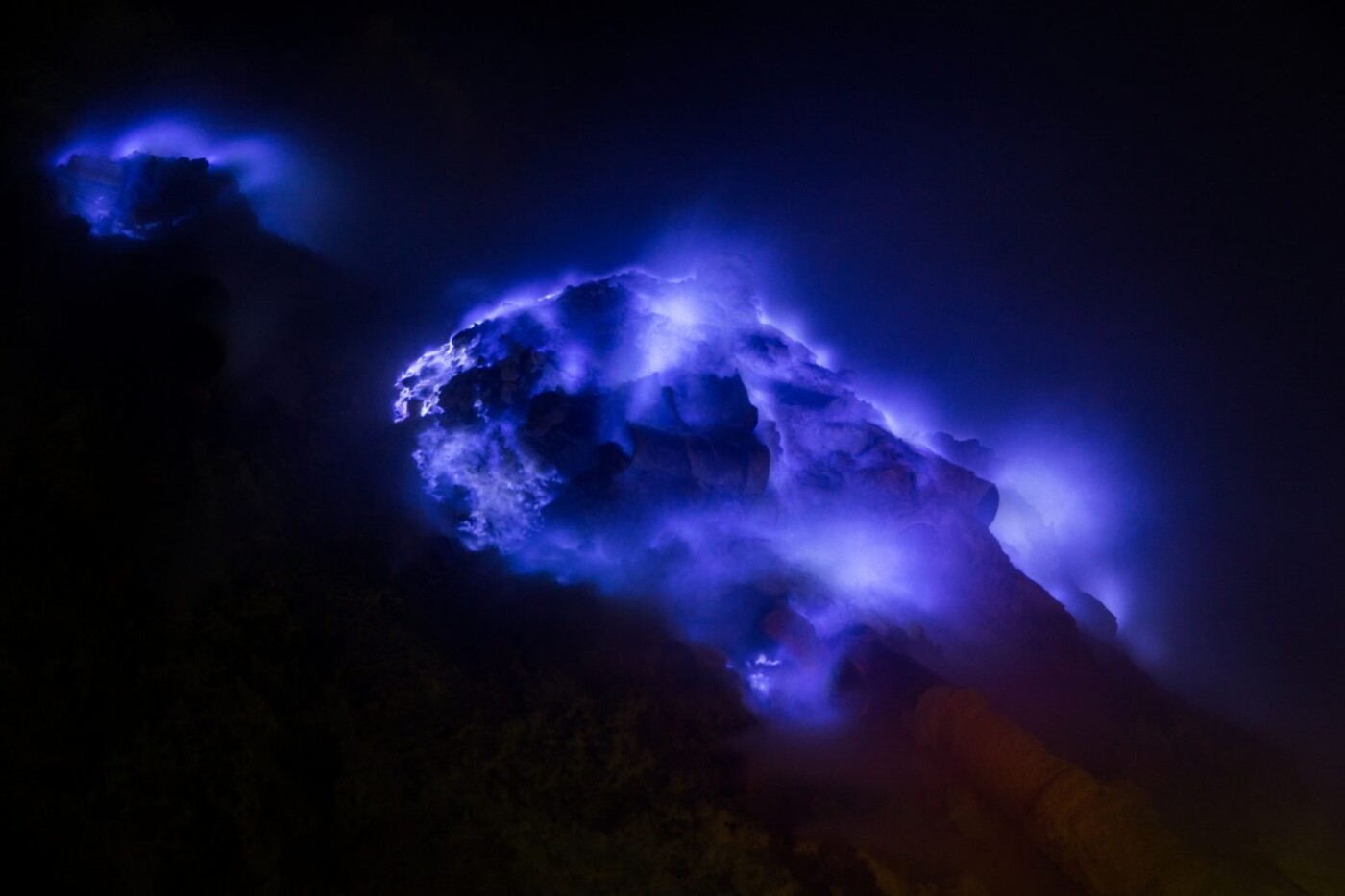
The Short Hike Up Ijen Volcano
The hike up was tough, but rather short (it took us no more than 1.5 hrs to reach the top), just as expected. The most gruelling part of the hike and the reason for our mixed feelings about the experience was the long descent and ascent to the base of the crater. While it once was a hidden gem of East Java, taking an Ijen Blue Flame tour is now a fully-fledged tourist trap.
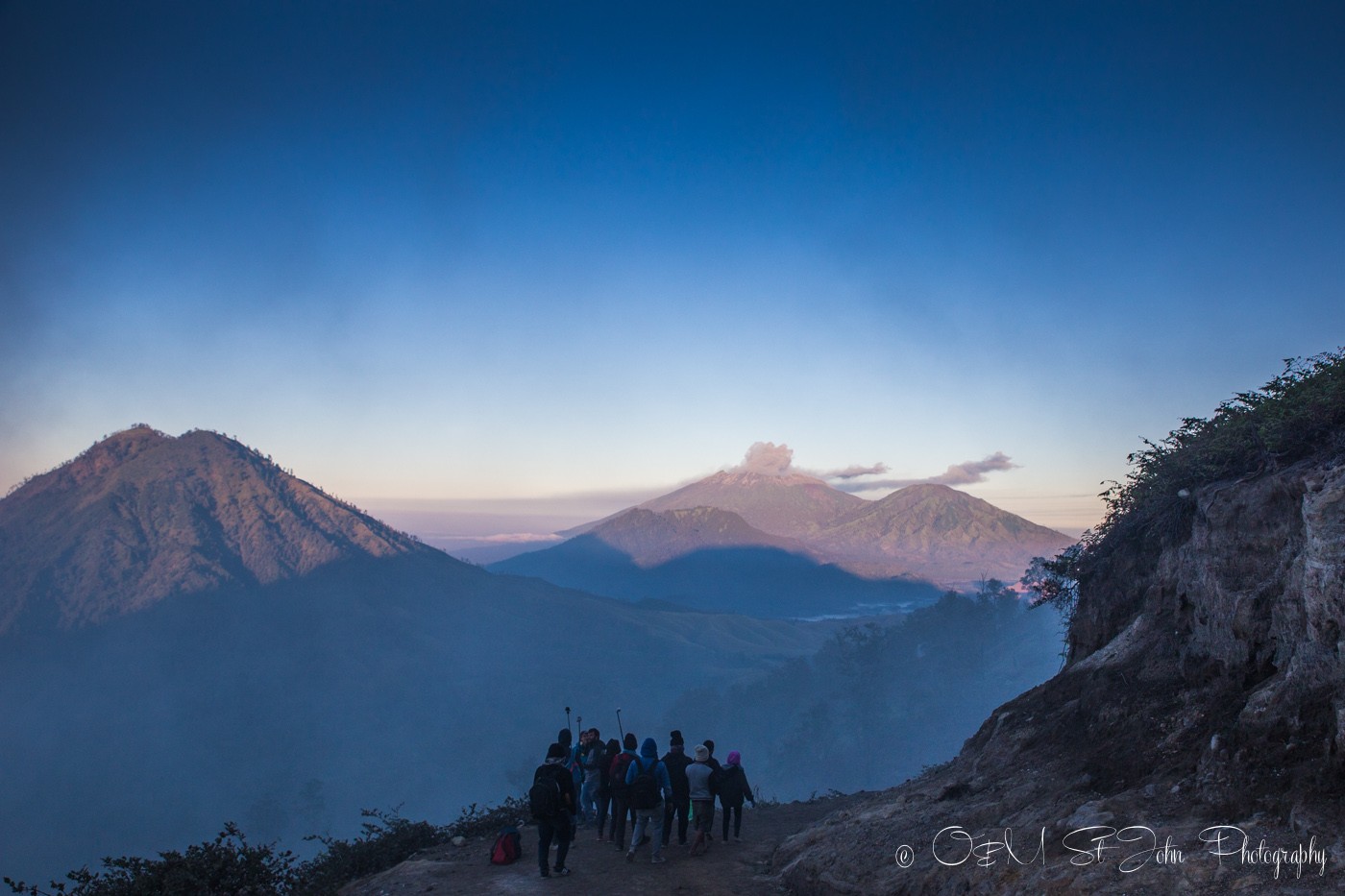
The Harrowing Descent to the Bottom of Ijen Crater
We shared the narrow steep rocky path down to the bottom of Ijen Crater with at least 300 others. There was no time for photos, no time for distractions. Every step was carefully calculated to avoid tripping over another person or sliding down on loose rocks.
We have to admit, it wasn’t the safest activity we’ve ever participated in. Thankfully, our guide from Blue Flame Tour was holding Oksana’s hand the entire time. Leading us down the safest path to the heart of the Ijen volcano.
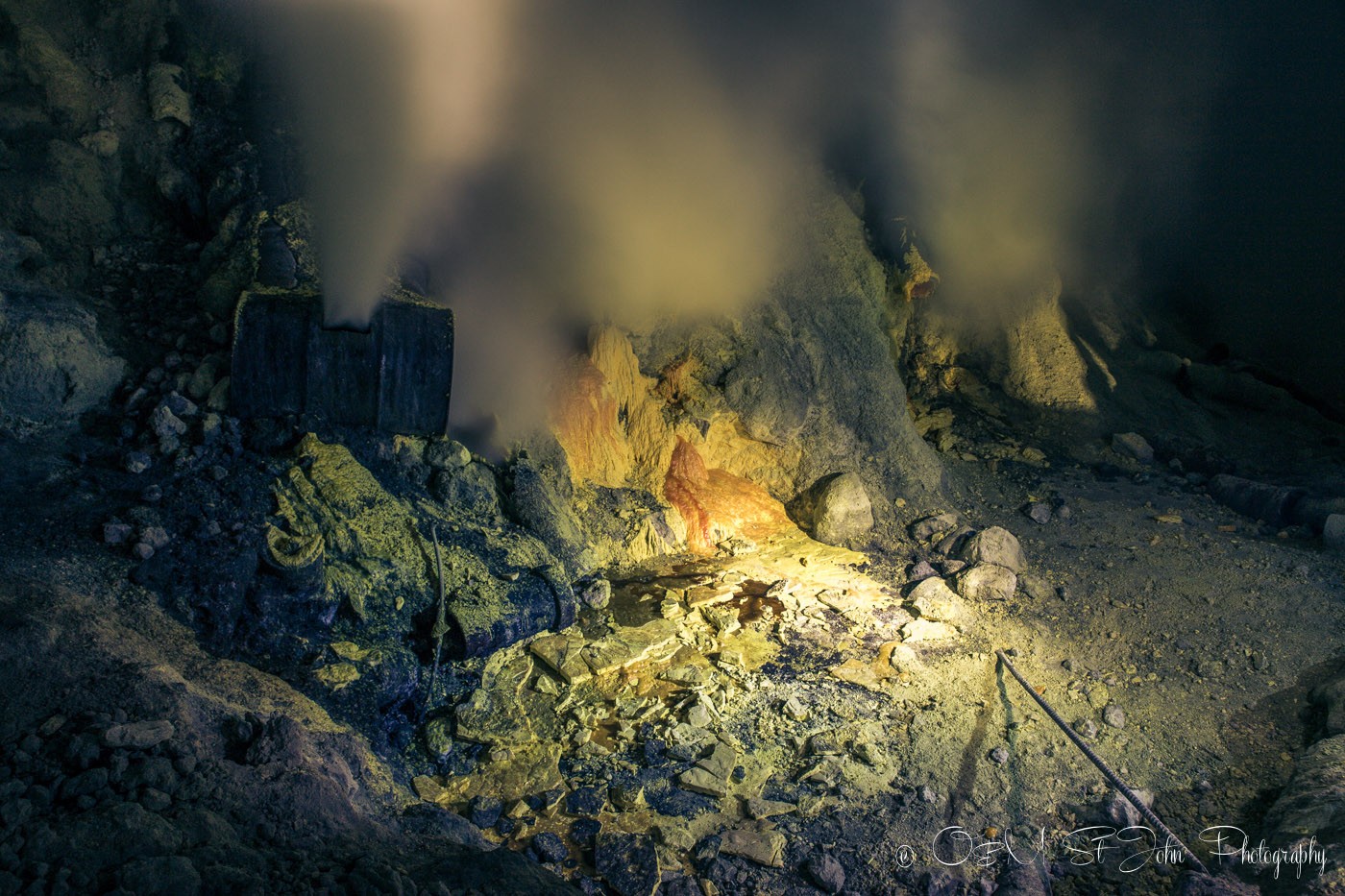
When we reached the bottom, things only got worse. The wind was strong and the sulfur gas clouds would at times cover us head to toe. Making us eternally grateful for our high-quality gas masks. But even with the gas masks on, we were still uncomfortable. Coughing away when the sulfur fumes seeped through the masks and caused our eyes to water.
And the Ijen blue fire… well… maybe we didn’t get lucky. Or perhaps the whole blue flame promise is more hyped up than it should be. Despite our struggles to capture it on camera, the flame was definitely there. At times the Ijen blue fire would peek out from the cloud of yellow sulfur smoke, sending the crowd of observers into a synchronized “wow”…
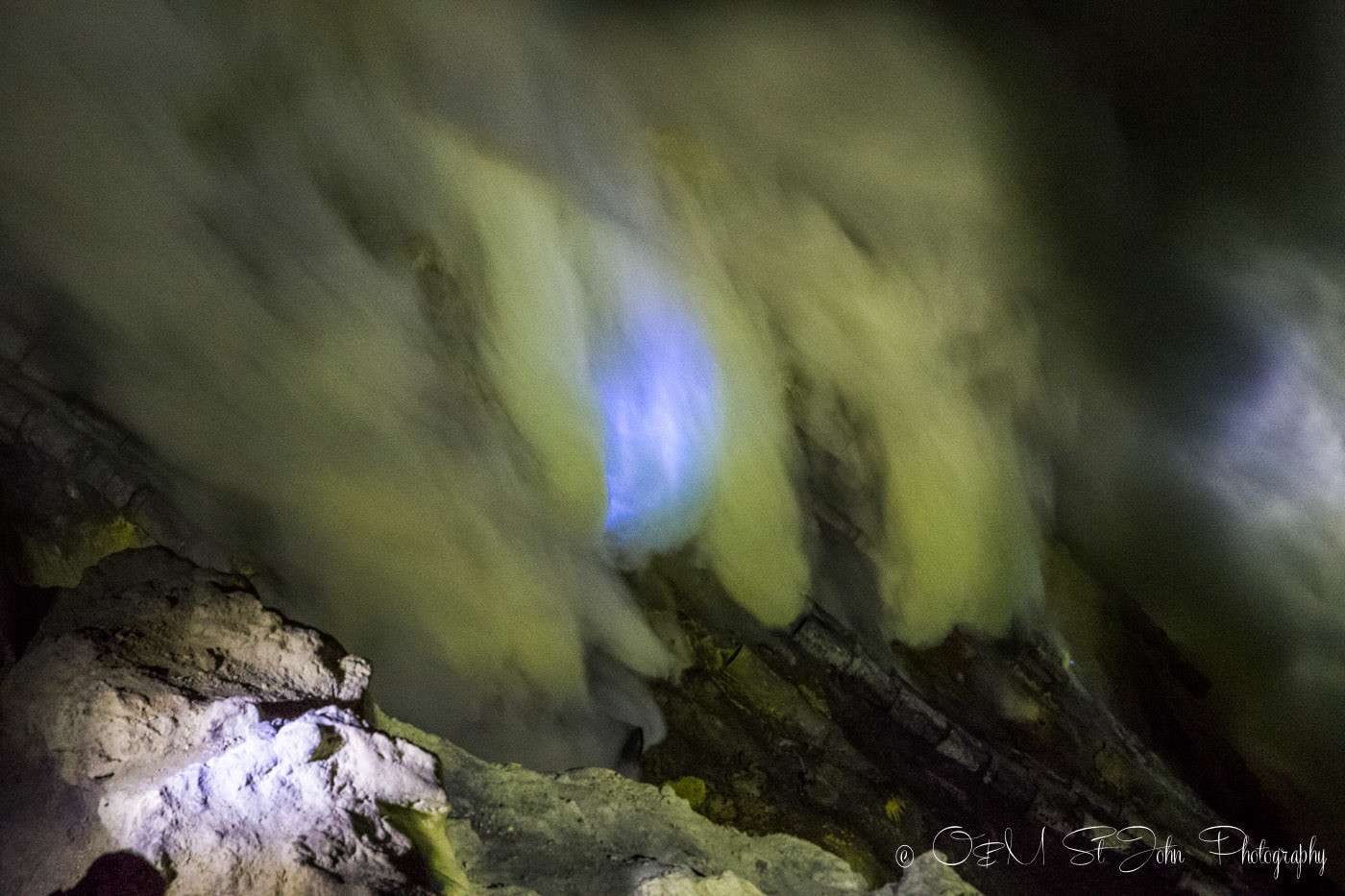
Was it an incredible mind-boggling sight? We’re sorry to say, but for us, it wasn’t. Sure, it was cool. But the scary climb down and the subsequent gruelling climb up combined with the dangers of being exposed to sulphur flames just wasn’t worth it.
Our group surfaced at the top with a unanimous conclusion: the last 2 hours probably shaved at least 5 years of our lives (a bit of an exaggeration, please don’t freak out, Mom), but the consensus remained true. In hindsight, we would have all been better off without seeing the Blue Flames.
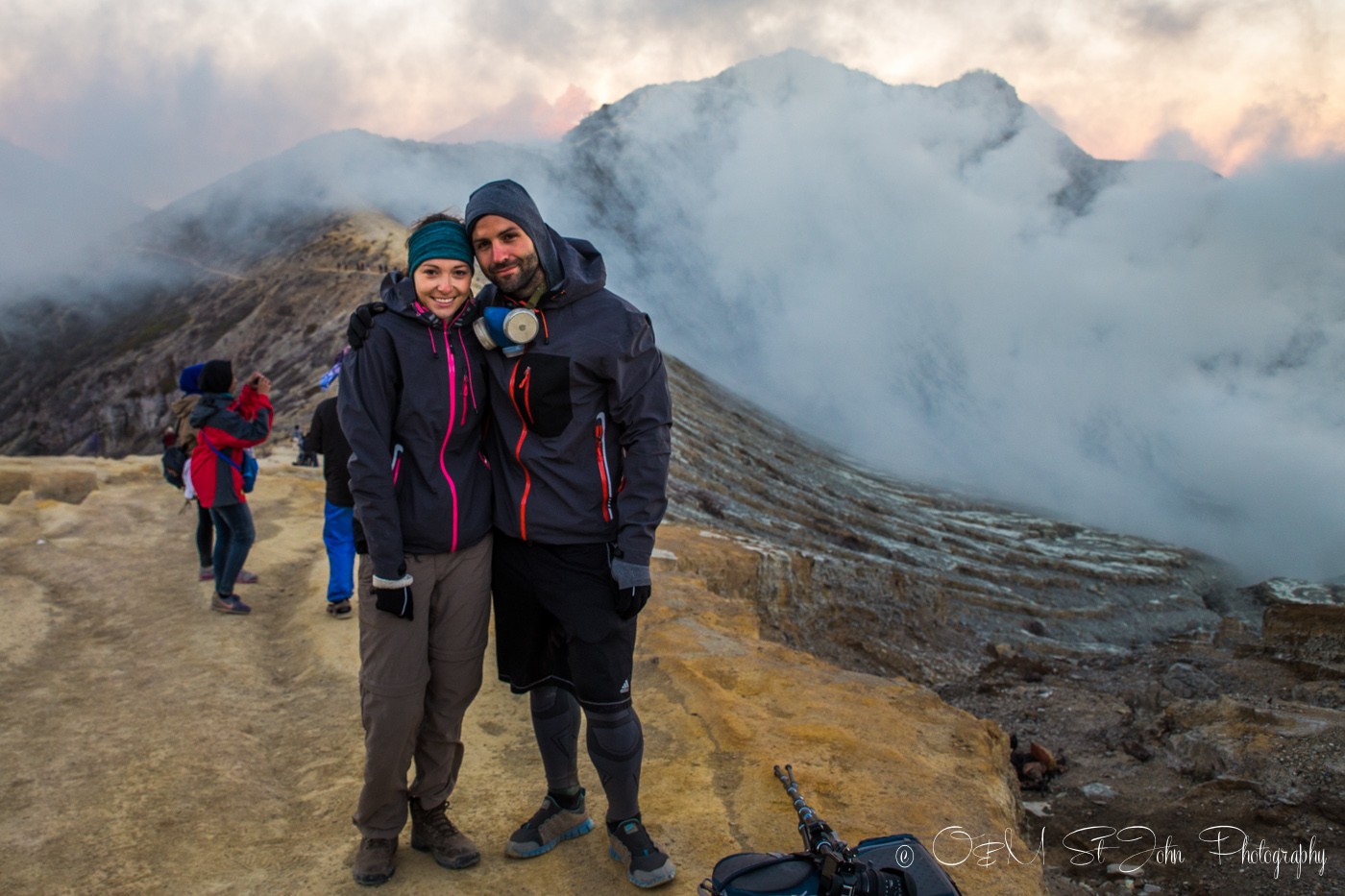
But before you close this page and cross Mount Ijen off your Indonesia to do list, let me share the reason why we thought the hike to Ijen Plateau is an ABSOLUTE MUST!
The Unexpected Surprise At the Ijen Crater
After ascending from the bottom of the crater to the Ijen Crater rim, we sat down patiently awaiting the sunrise. Cold (did we mention it’s freezing at the top?), grumpy, and irritated by the overrated Ijen Blue Flame tour. We weren’t too stoked for sunrise. We ’ve seen a lot of great sunrises in our lives and didn’t expect this one to be anything extraordinary.
Boy, were we wrong…
The views were ABSOLUTELY BREATHTAKING…
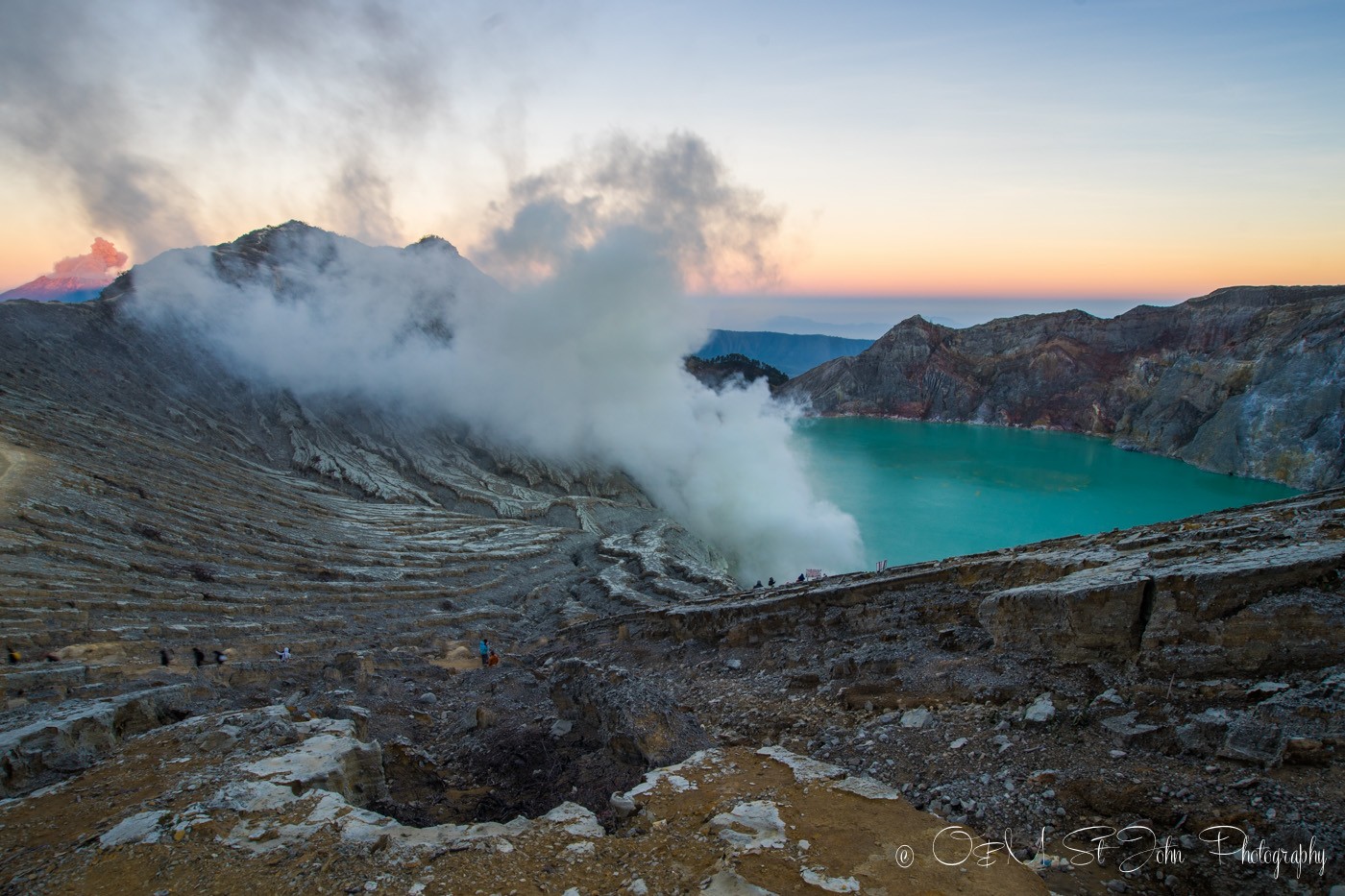
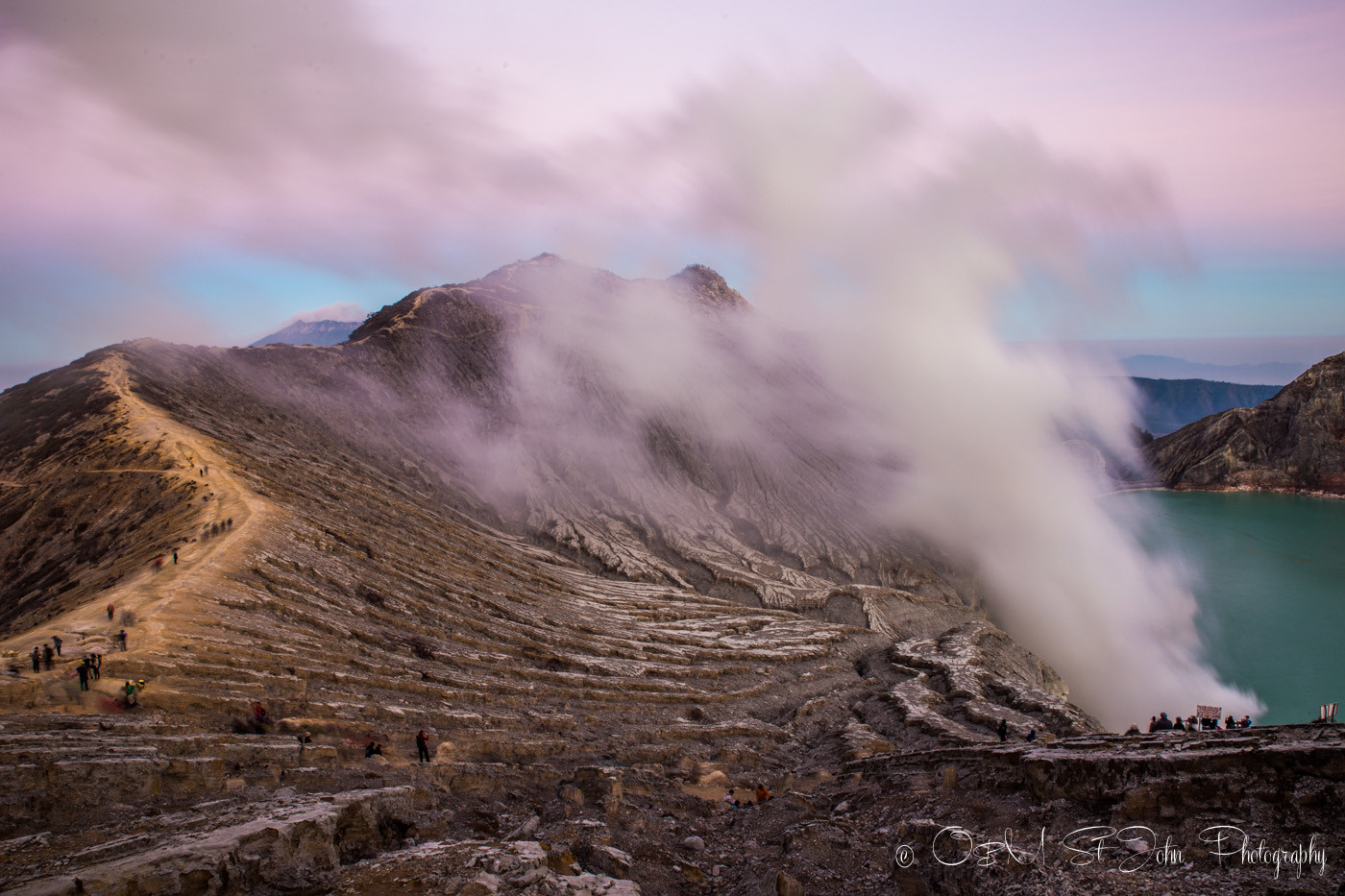
As the sun rose above the horizon, the sky transformed from crispy blue into a kaleidoscope of pink hues. It was the most beautiful sunrise we have ever seen.
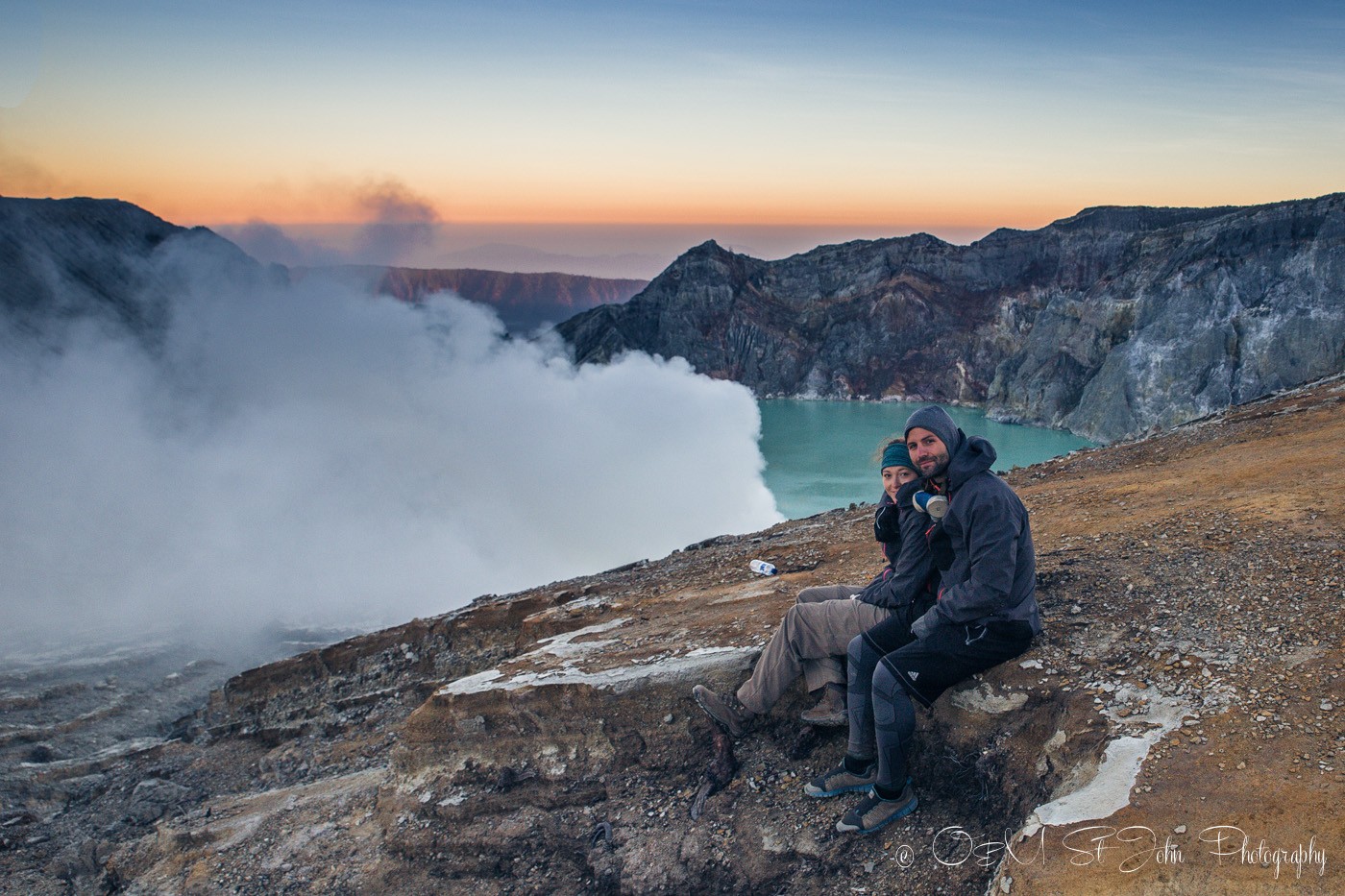
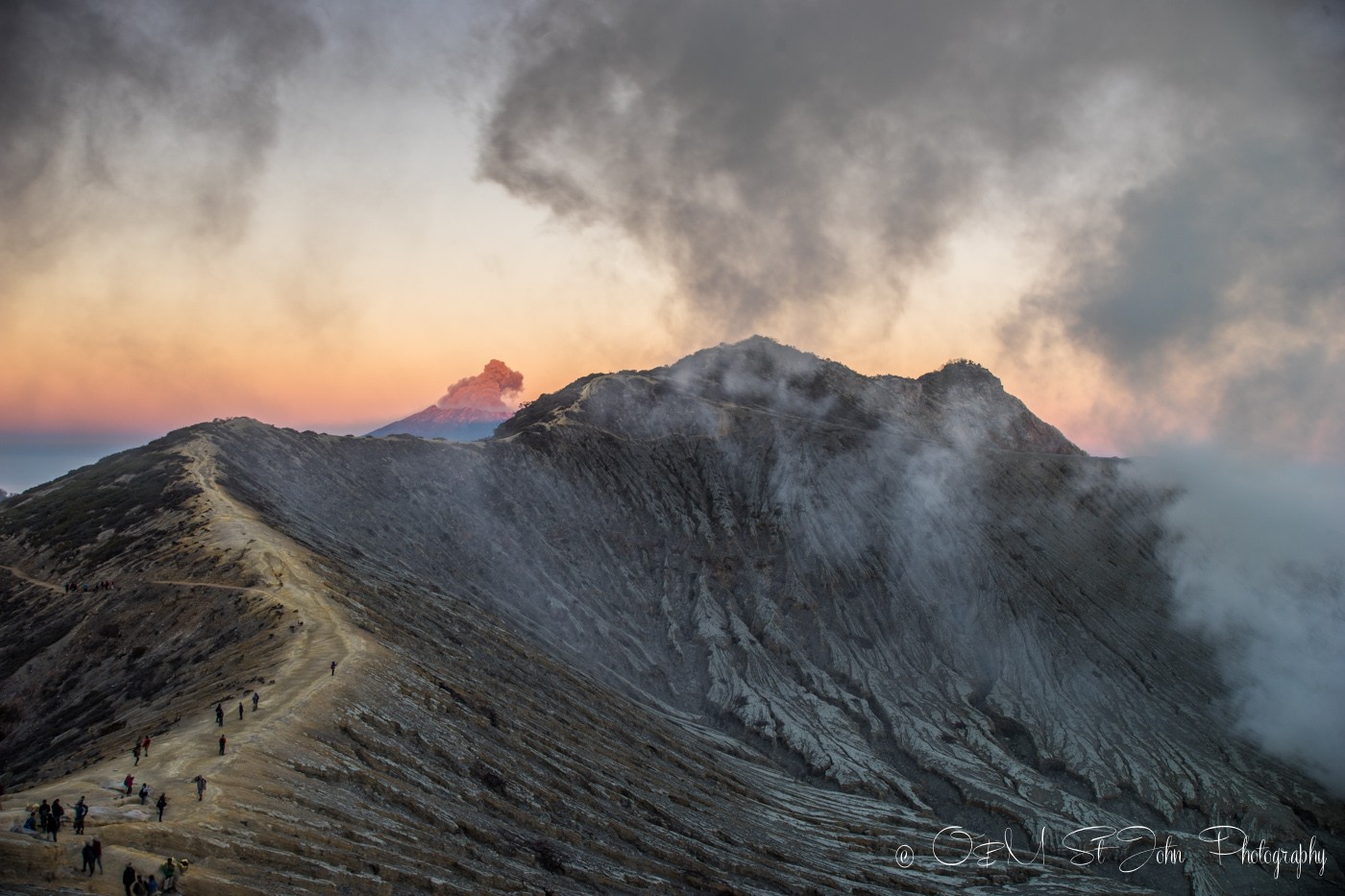
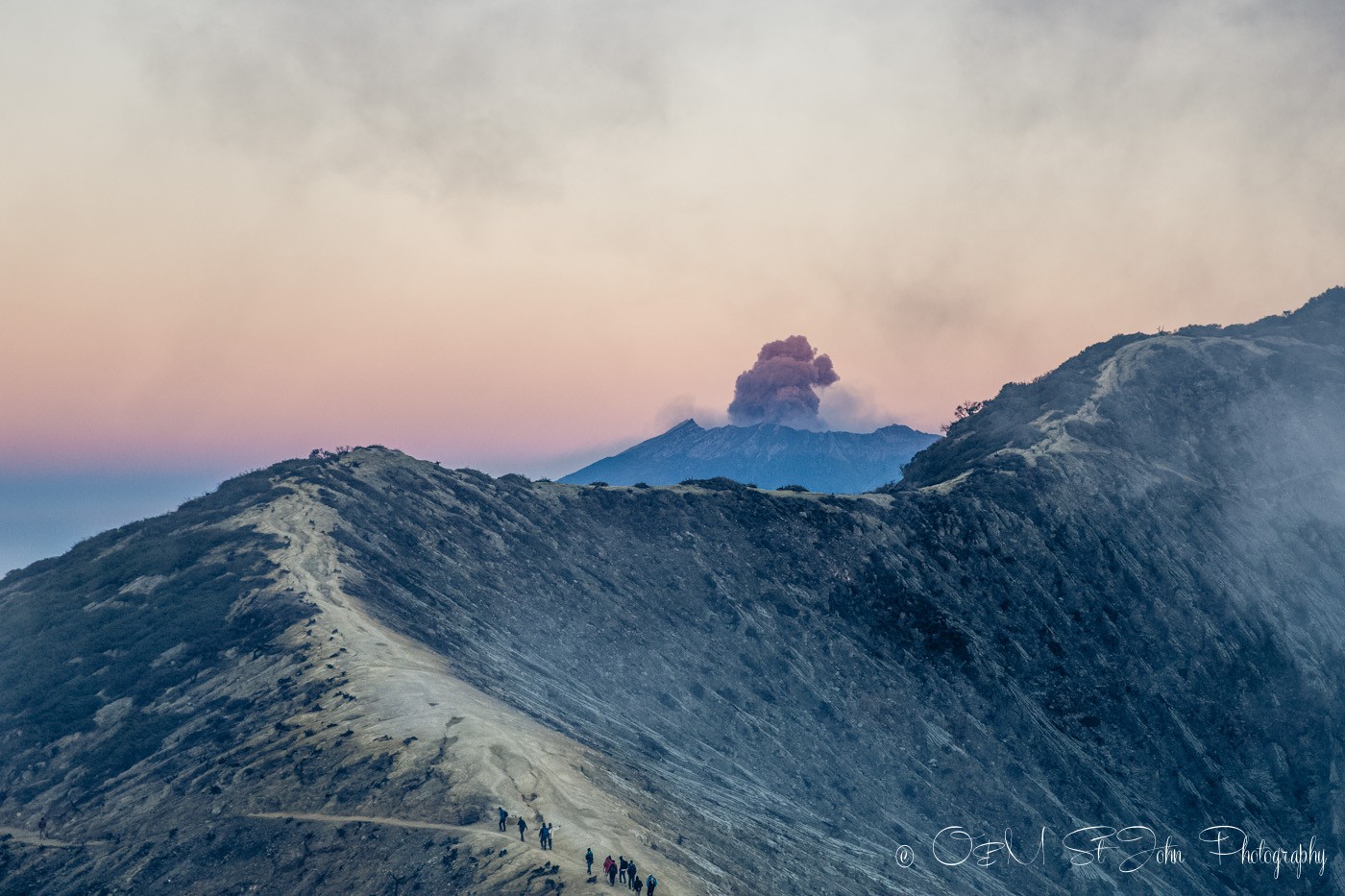
The descent was rather uneventful (other than the excruciating pain caused by the blisters on our feet). Which allowed us to take in the views around us and really appreciate the surroundings.
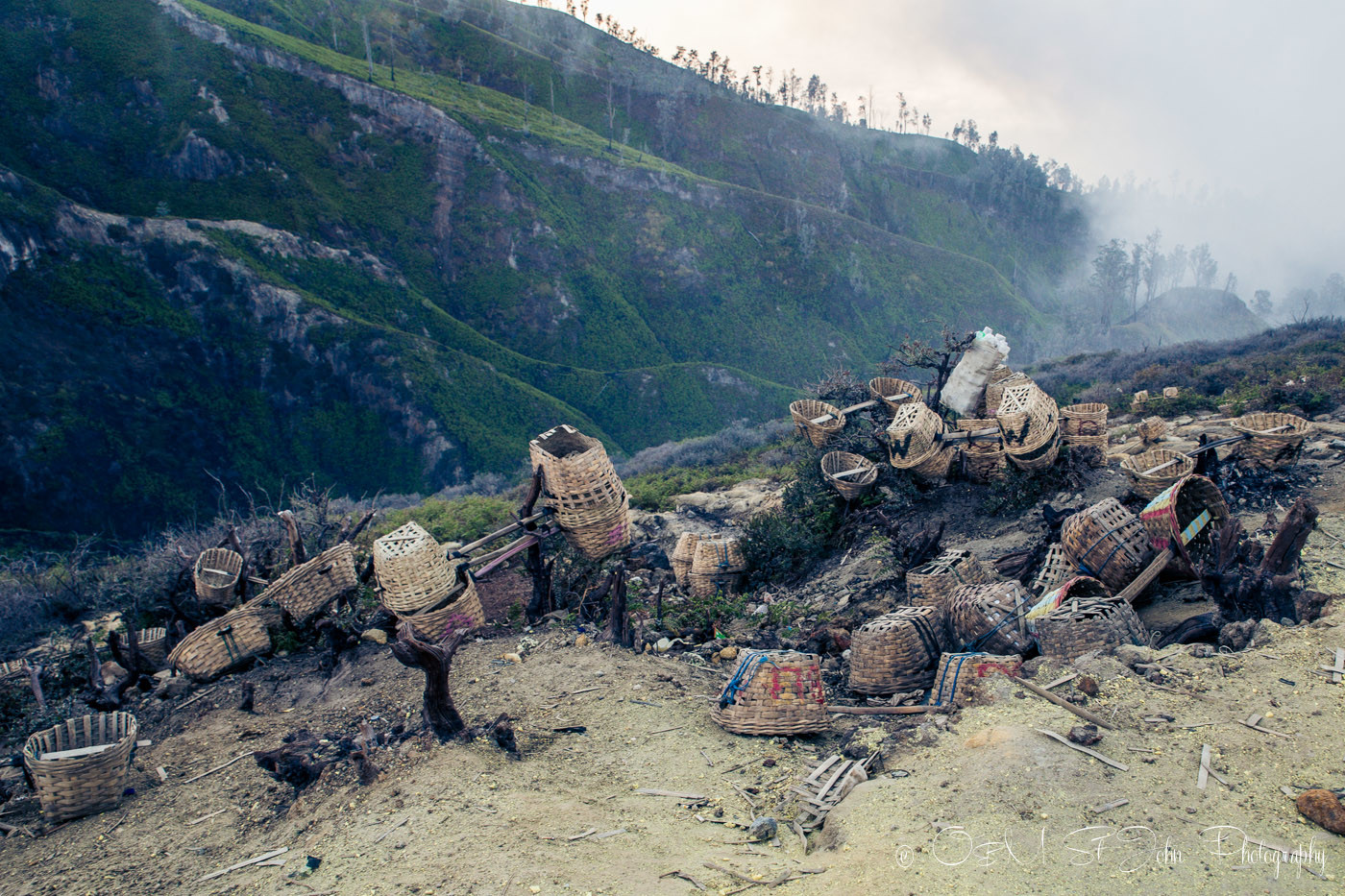
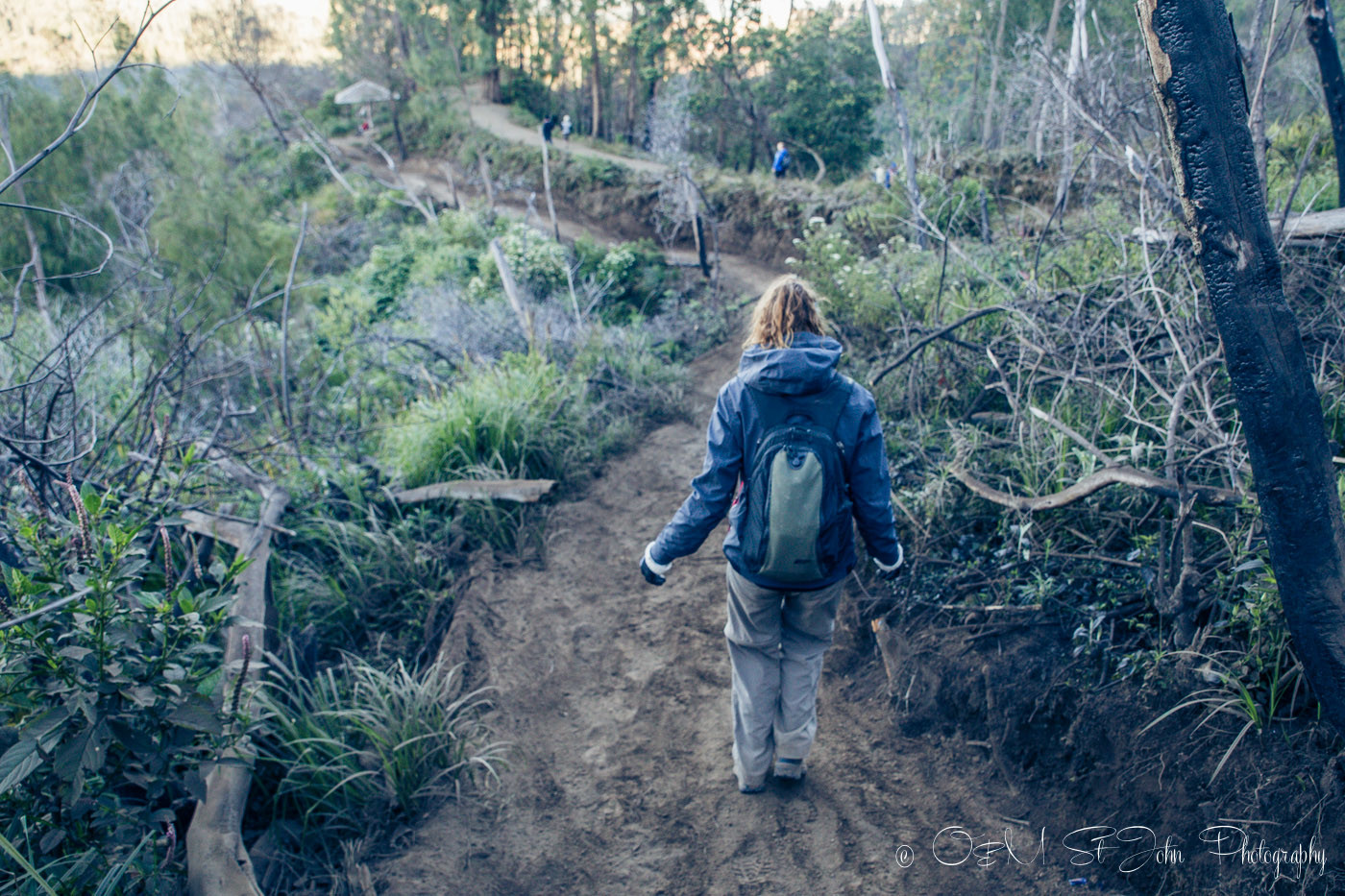
The Sad Truth Behind Mining at Ijen Crater
If there was one thing that touched us more than the stunning views of the Ijen Plateau was the truth behind sulfur mining at Ijen, Indonesia.
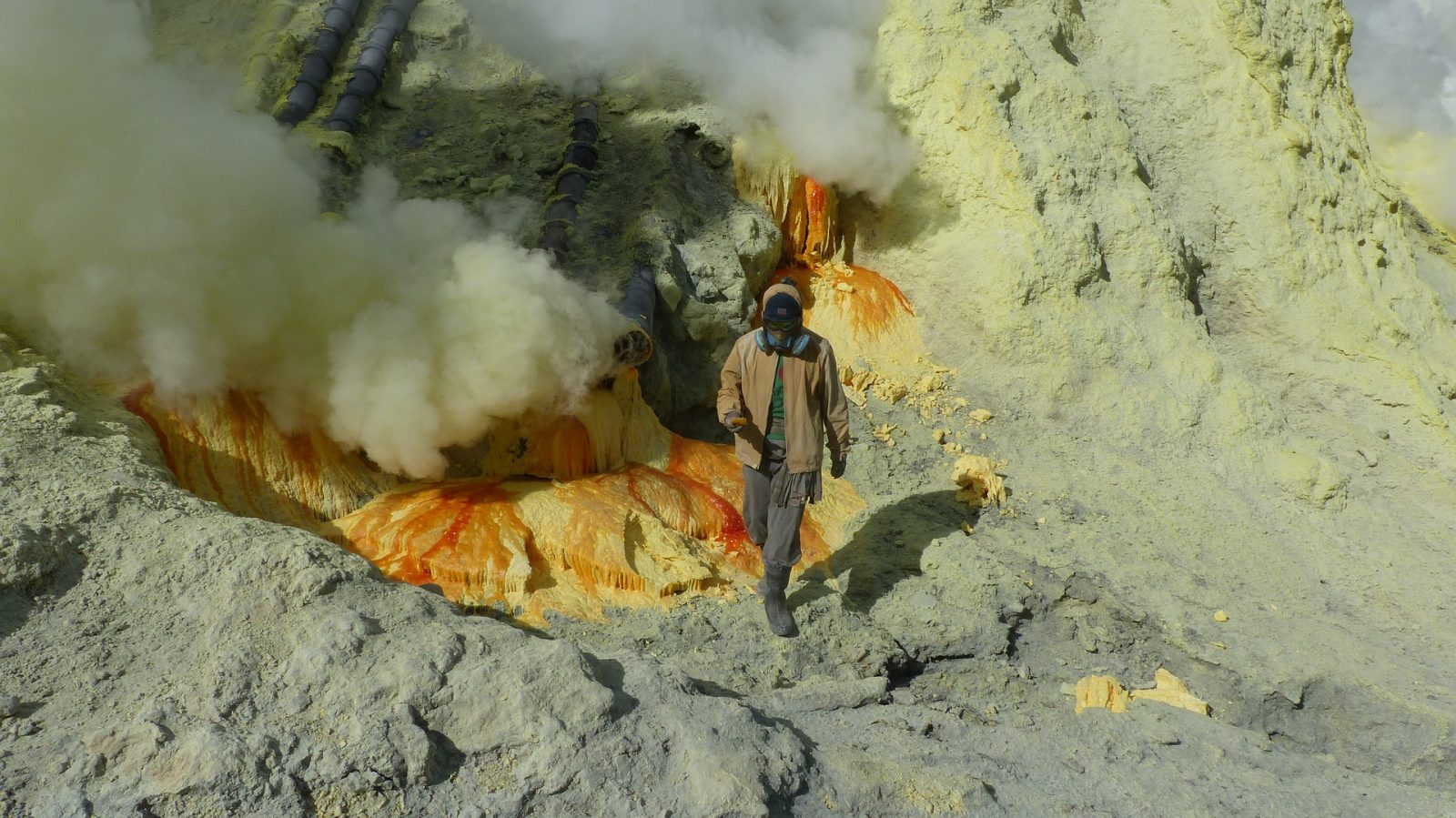
Sulphur collectors at Ijen work for a minimum wage and visibly terrible conditions. They hike up early in the morning, work straight through until around 1 pm when the clouds roll in and make it impossible to navigate the plateau.
Most of them use wet cloths to protect themselves from the sulphur flames and suffer from a myriad of respiratory afflictions. It’s not uncommon to see miners carrying 40-50kg of sulphur back up to the surface without any footwear on.
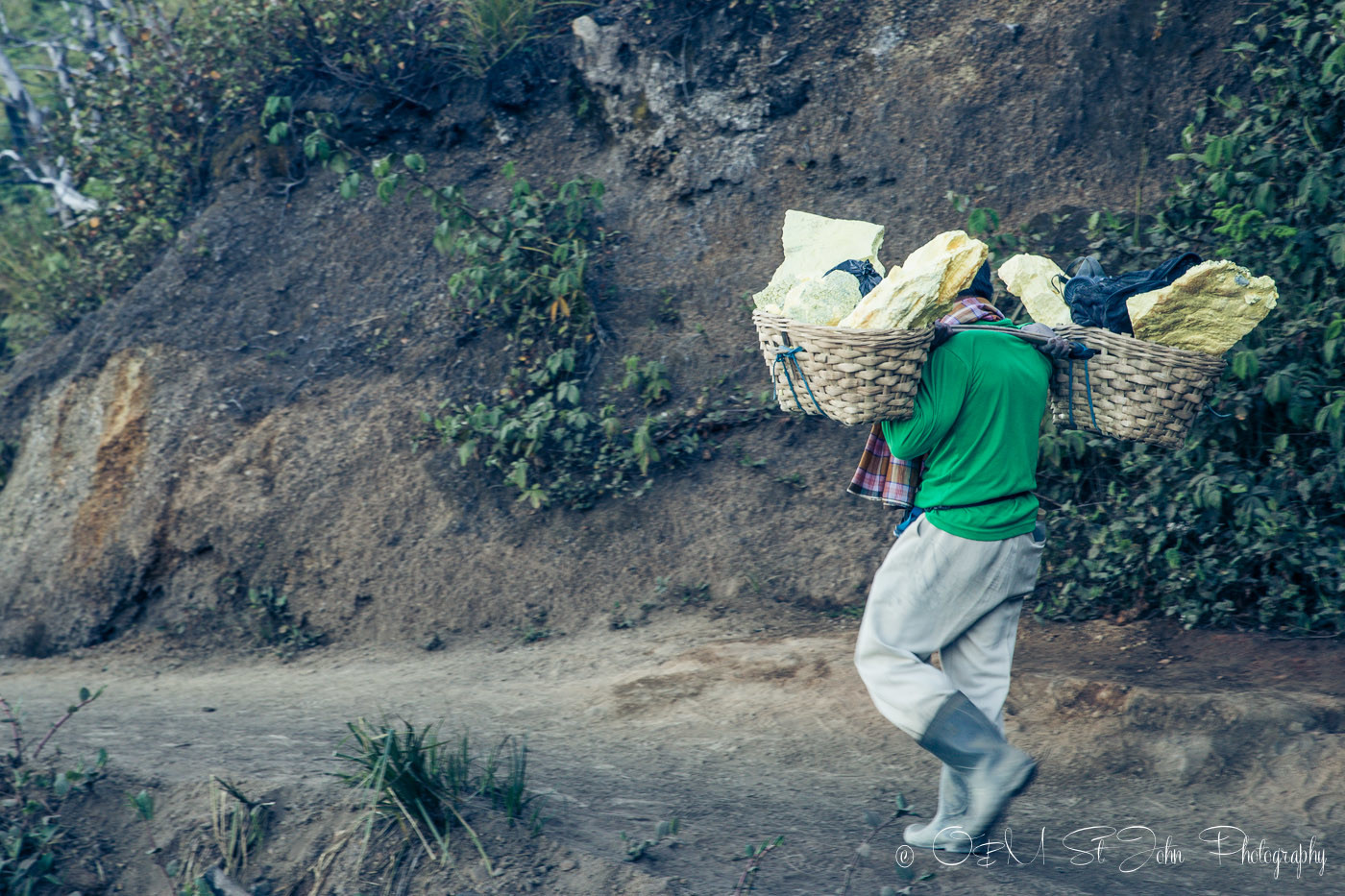
We were told that the going rate for sulphur is only about 800 IRP (less than AUD $0.08 per kilo). So a 2-3 hour return trip with 40kgs of sulphur would only make the workers about AUD $3.
The demand for sulphur is only increasing as cosmetic companies around the world continue to use it as an ingredient to treat acne, seborrheic dermatitis, rosacea, eczema, and dandruff. The mineral found specifically at the Ijen Crater is known to be purer and more desirable.
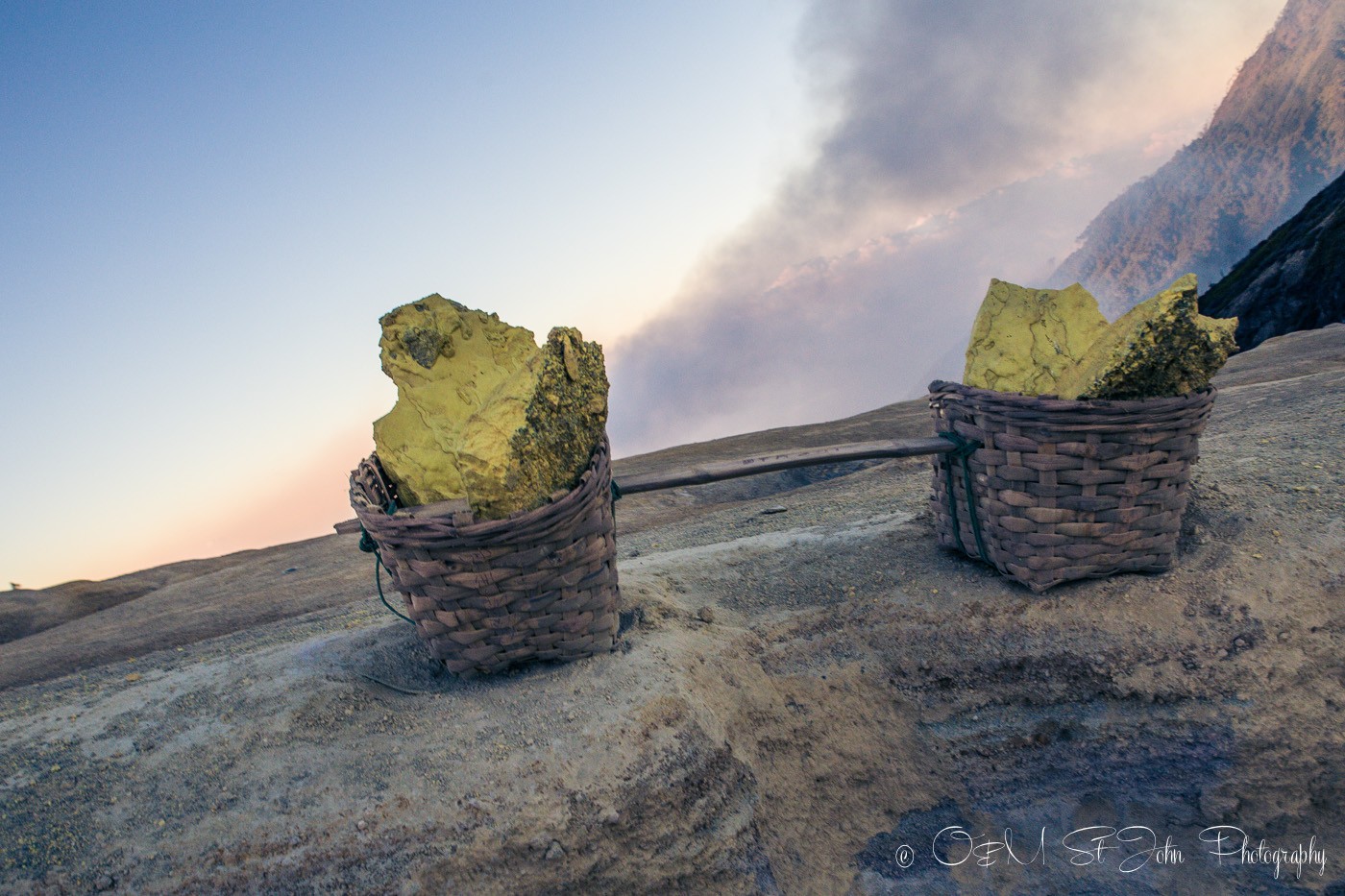
So in the eyes of the Chinese mining company that operates in the area, its commercial benefits far outweigh the exploitation of miners and the horrendous working conditions they endure at Ijen on a daily basis.
Avoid supporting this industry by only buying from reputable companies, or choosing natural cosmetics over ones that use sulphur in their formulas. Otherwise, start from within. There are countless sulphur-rich fruits and vegetables that can be used as substitutes such as veggies from the cruciferous and allium family, and watermelon.
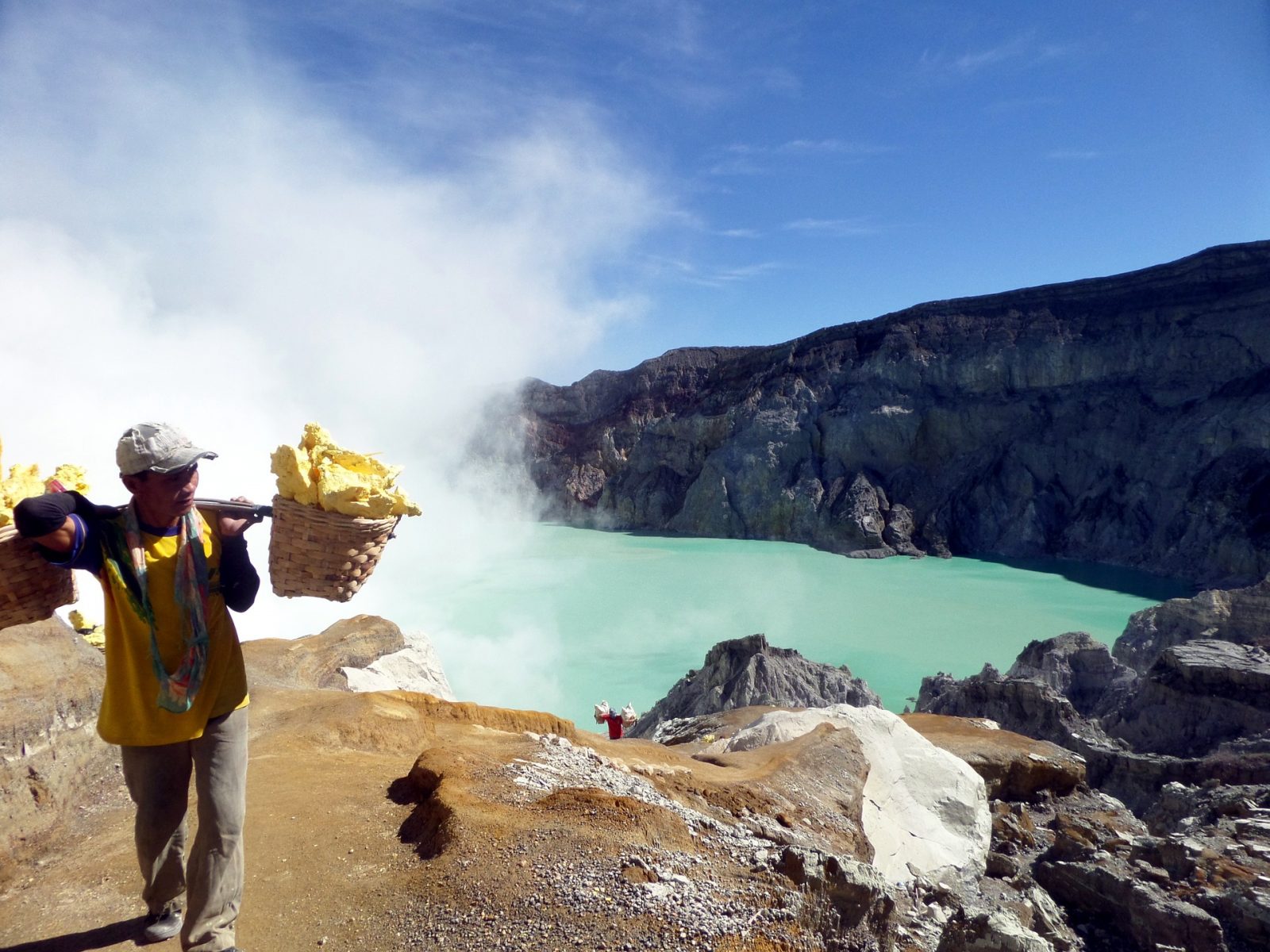
ESSENTIAL TRAVEL INFO
Getting There
Ijen Plateau can be accessed via the towns of Bondowoso in the west or Banyuwangi in the east. Typically travelers coming from Western or Central Java make their way to the Probolingo Train Station (Mount Bromo) which offers several daily trips to Banyuwangi. Otherwise, Java is well connected by bus with direct buses on offer to Bondowoso, or Banyuwangi from the Probolingo Bus Station.
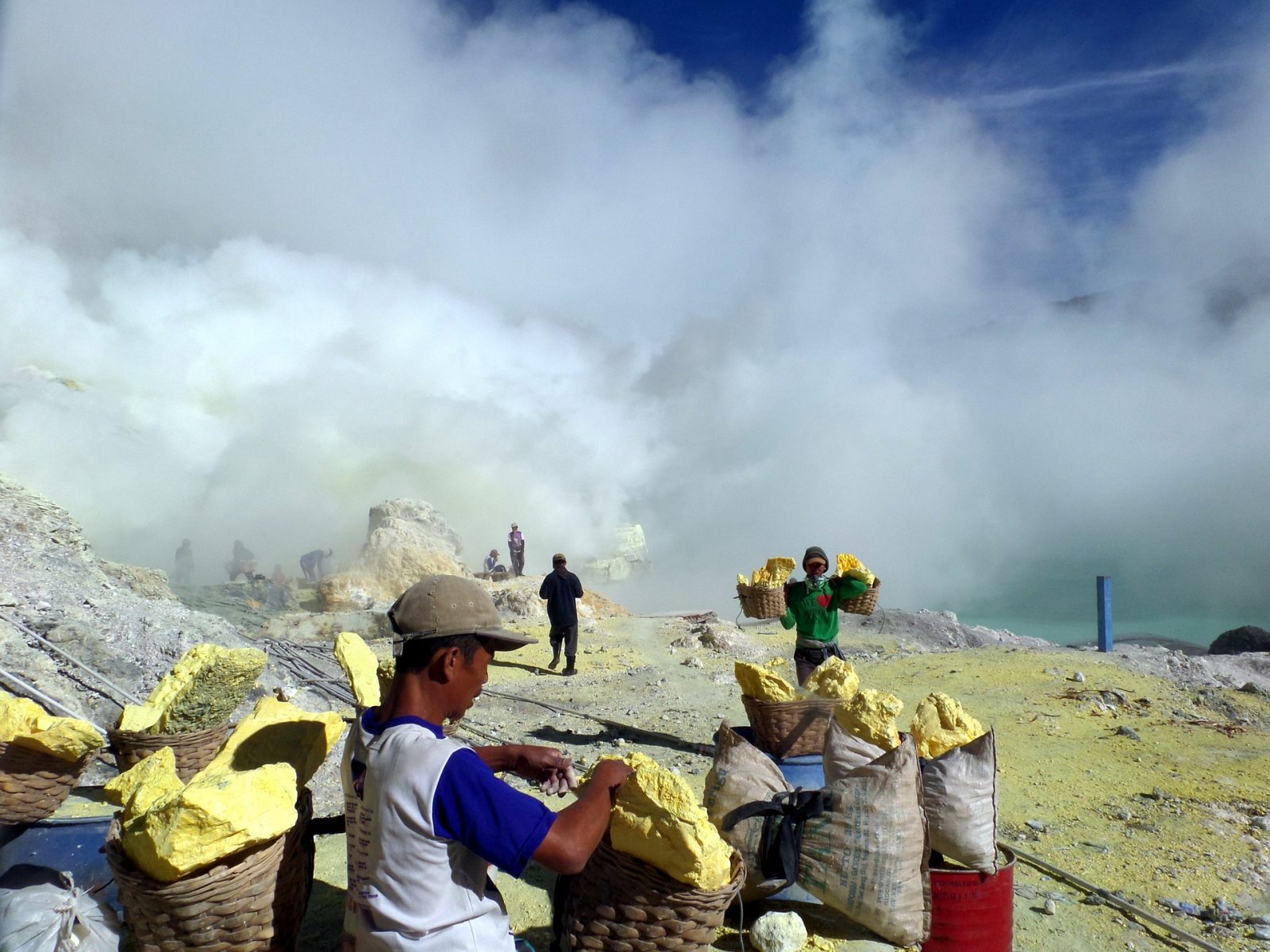
Alternatively, there is a convenient ferry that shuttles visitors across the Bali Strait to and from Bali. It is a short drive from Bondowoso and Banyuwangi to the Port of Ketapang, where the ferry disembarks from.
Tours to Ijen Crater
We started our trip from Banyuwangi on a tour with Blue Flame Tour company, which cost us 1,150,000 for two people. It included rental of gas masks, which are an ABSOLUTE MUST when visiting the crater.
Whether you’re in the area already or are making plans for the future, there are three main tour options for you to pick from.
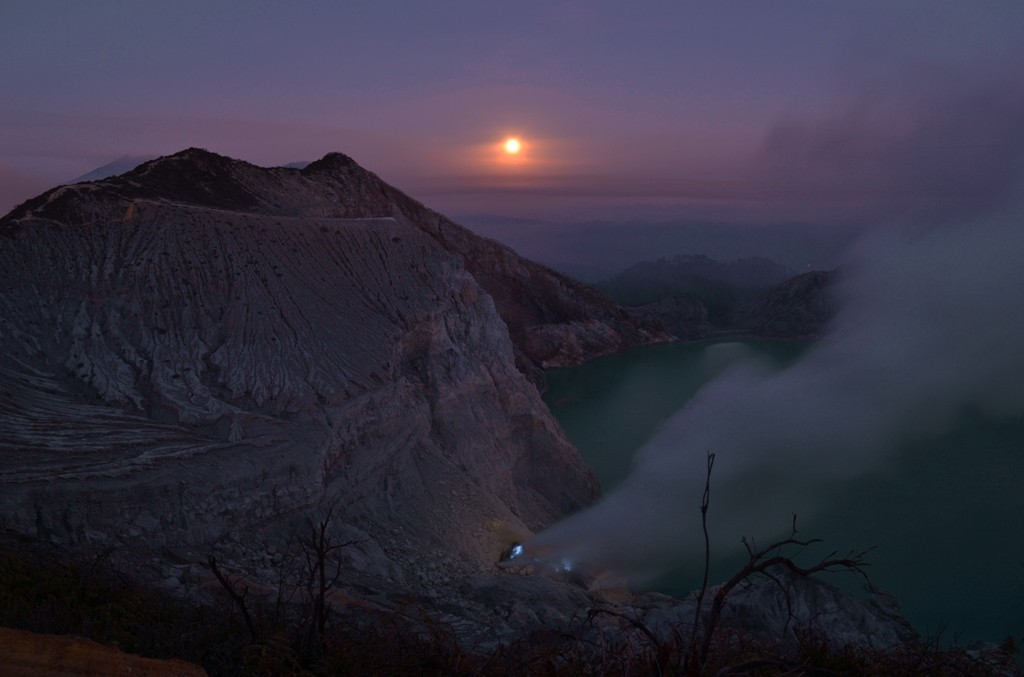
Ijen Crater Tour Options:
From Banyuwangi: Ijen Crater Sunrise Hike
If you’re in the area already and can get to Banyuwangi, this tour is your best bet. The tour starts at midnight, and the hike lasts about 2 hours. You’ll have plenty of time to see the blue flames and appreciate the sunrise on your way back.
From Bali: 24-Hour Trip to Ijen Crater & Javanese Breakfast
If you’re staying in Bali, then this tour will likely be the most convenient option for you. It starts at 5 PM so you can make it to the volcano and begin the climb by 11 PM at the latest. After you see the blue flames and watch the sunrise, you’ll have breakfast with a local family before returning to Bali.
From Bali: 3-Day Excursion to Mt. Bromo & Ijen Crater
If you’re looking to make the most out of your time, then this option lets you see 2 top attractions, and you won’t have to worry about planning your itinerary. You’ll begin in Bali on the first day, see Mt. Bromo on the second, and by the third day you’ll be descending into Ijen Crater.
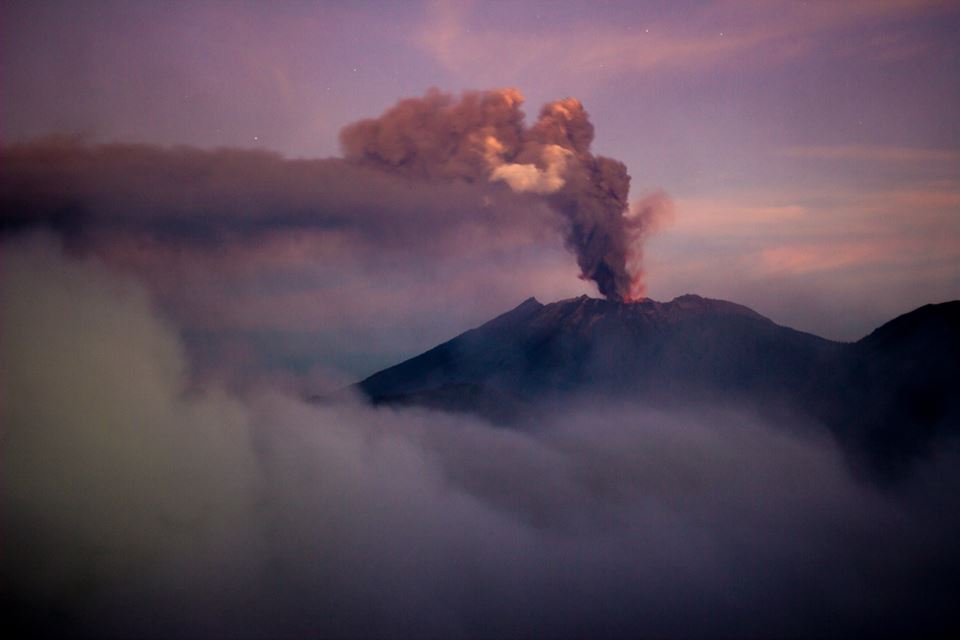
Where to Stay
Paddy Hills Homestay: Nestled among rice fields, this highly rated hotel is located in Banyuwangi, about 35 km (22 miles) from the start of the trailhead, where most people stay during their trip to Ijen, Indonesia. They offer a great breakfast.
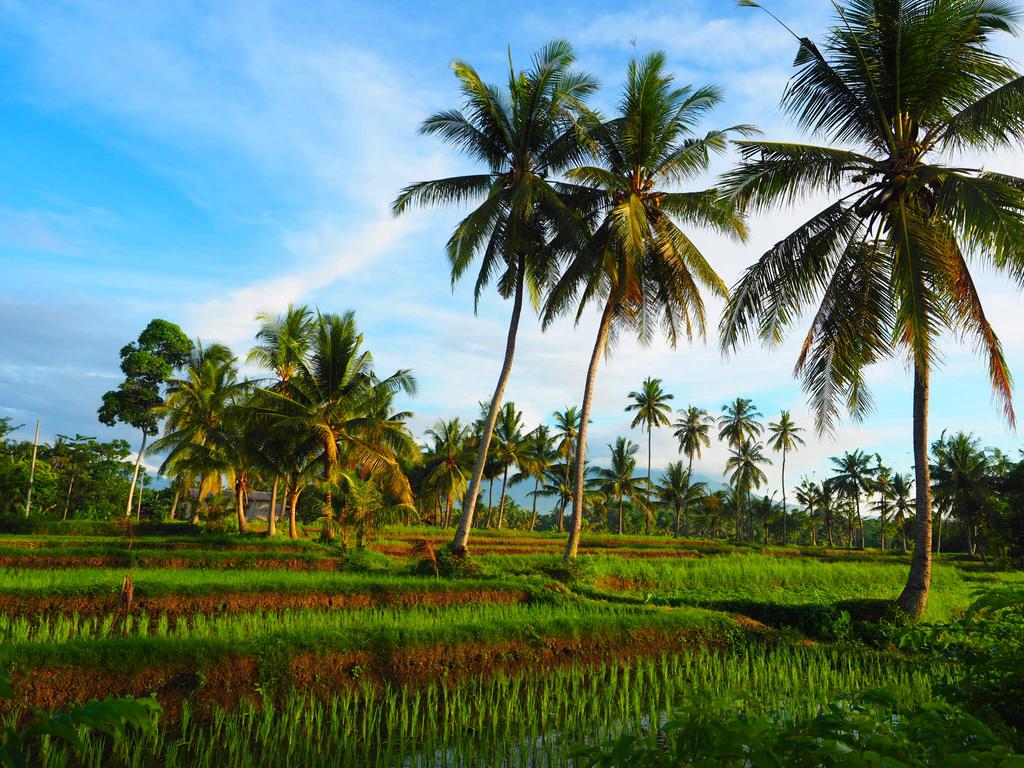
Didu’s Homestay Bed & Breakfast: This well-known accommodation is praised for its natural location, clean facilities, and welcoming staff. Again, they are located in Banyuwangi about 35 km from the start of the trailhead, where most people stay during their trip to Ijen.
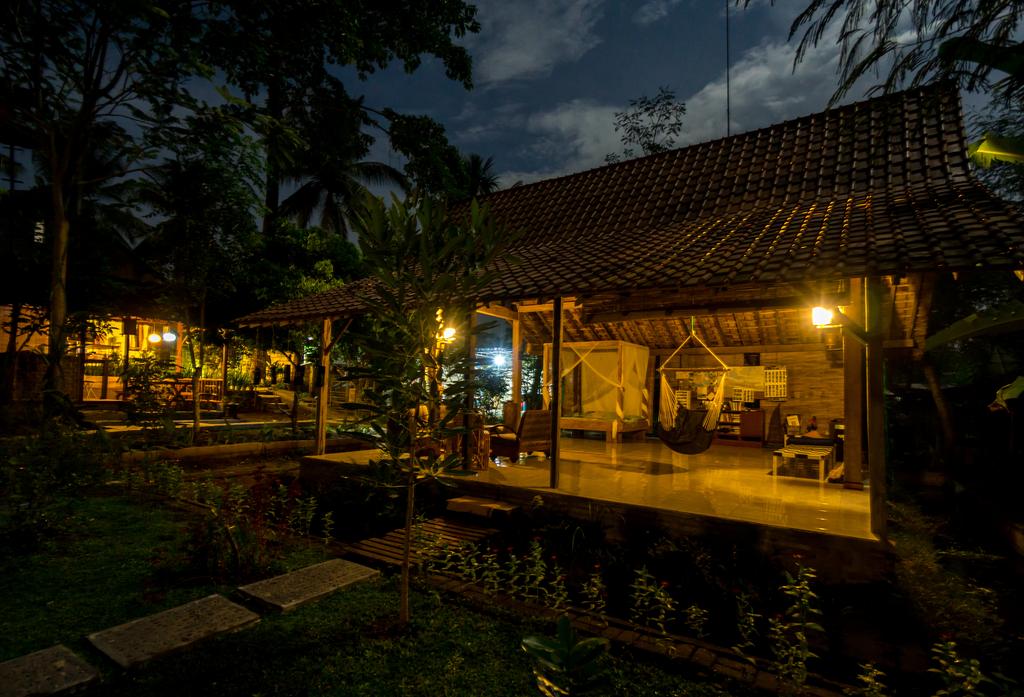
Margo Utomo Eco Hotel: Since the 1970’s this hotel, and its founders, have been living by their commitment to eco and agro-tourism. They offer basic accommodation set within a plantation and dairy farm. They are located approximately 80 km from Banyuwangi, which makes it a bit further from the crater hike. But speak to Blue Flame Tours, they may be able to arrange a pick up from here.
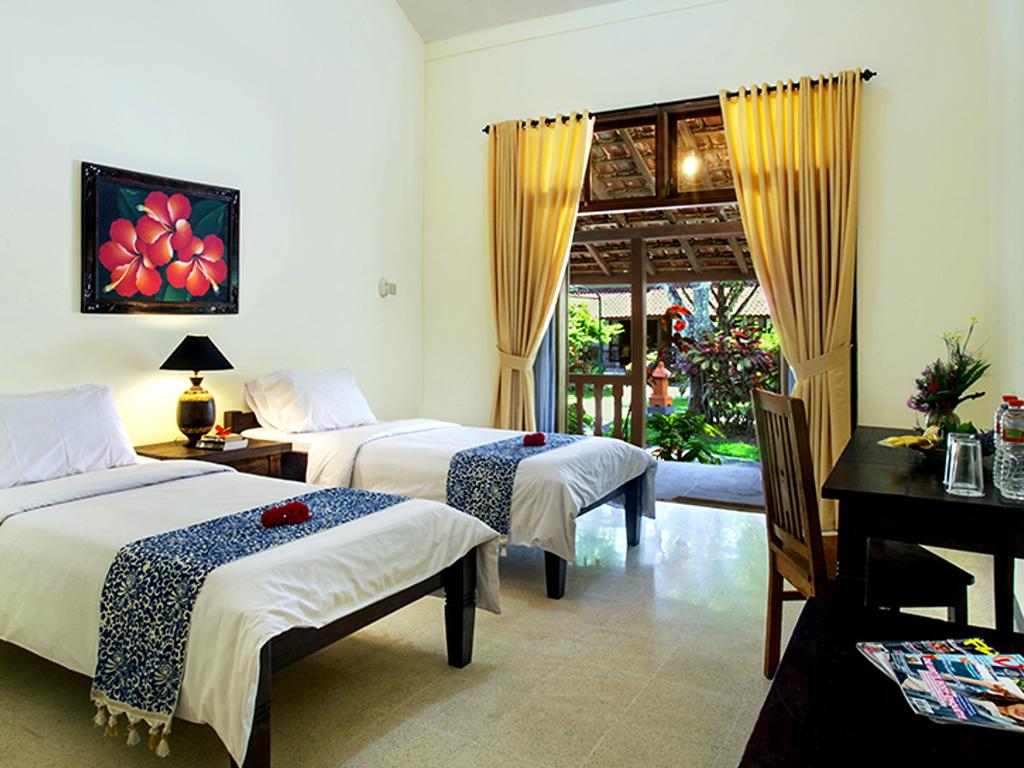
What to Expect
We took an hour-long ride to the base of the crater from Banyuwangi and commenced the hike up at around 2 a.m. We reached the crater rim around 3-3: 30 a.m and spent another 2.5 hours descending down to the base of the crater to view the blue flames and then making our way back up to the rim for sunrise at 5:30-6 a.m.
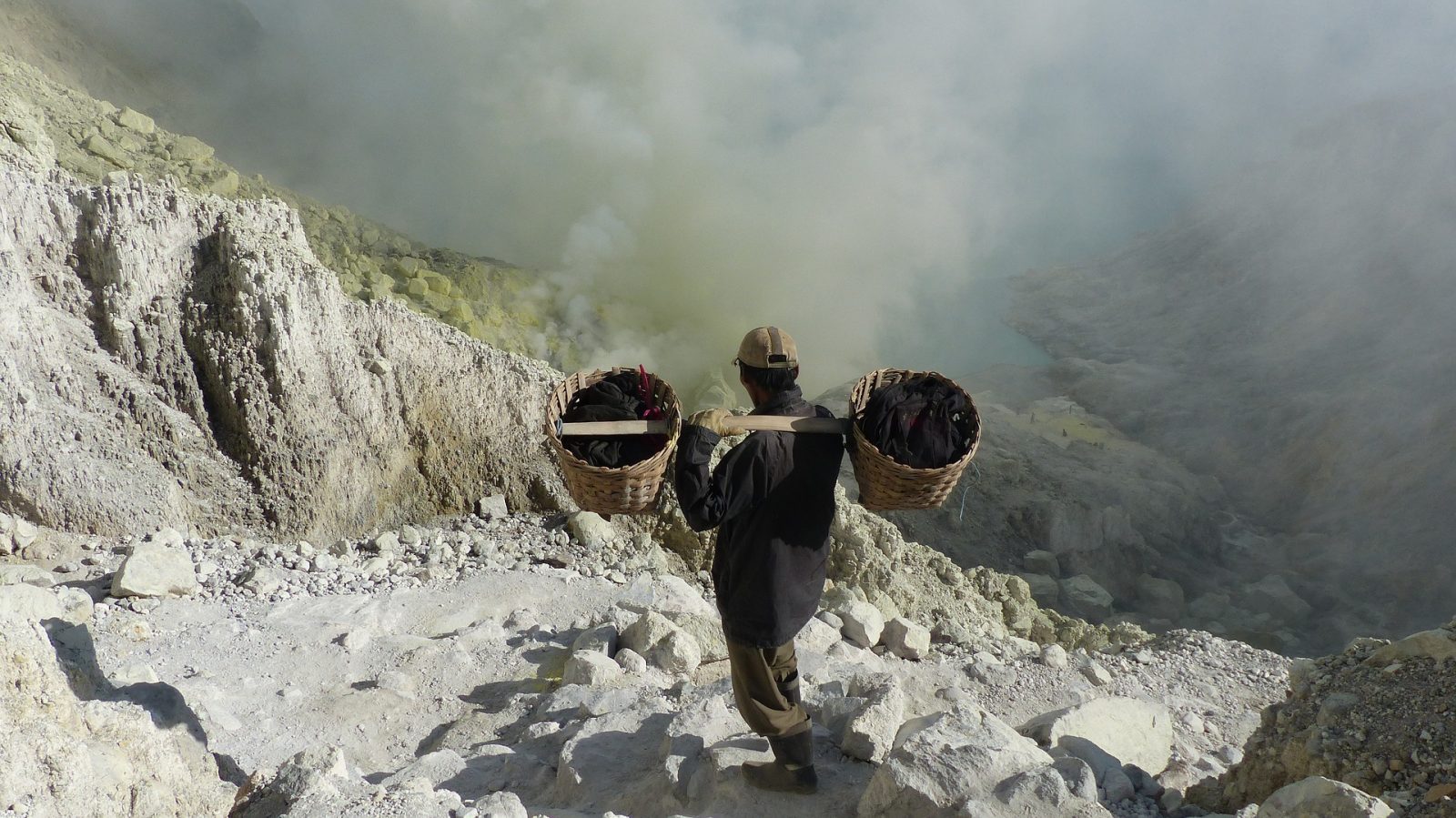
We were back in town by 8 a.m. Then dropped off at the Ketapang pier for the ferry crossing to Bali. Blue Flame Tours not only dropped off at the pier when we were finished, which saved us from renting a taxi. They also picked us up the night before near the pier. When the bus suddenly stopped and made us get out 20 minutes before the main town. They are simply great people.
Have you ever questioned your visit to a highly rated sight or destination like we have with our visit to the Ijen Crater? Leave a comment below, we’d love to hear your thoughts!
Like this post? Pin it for later!

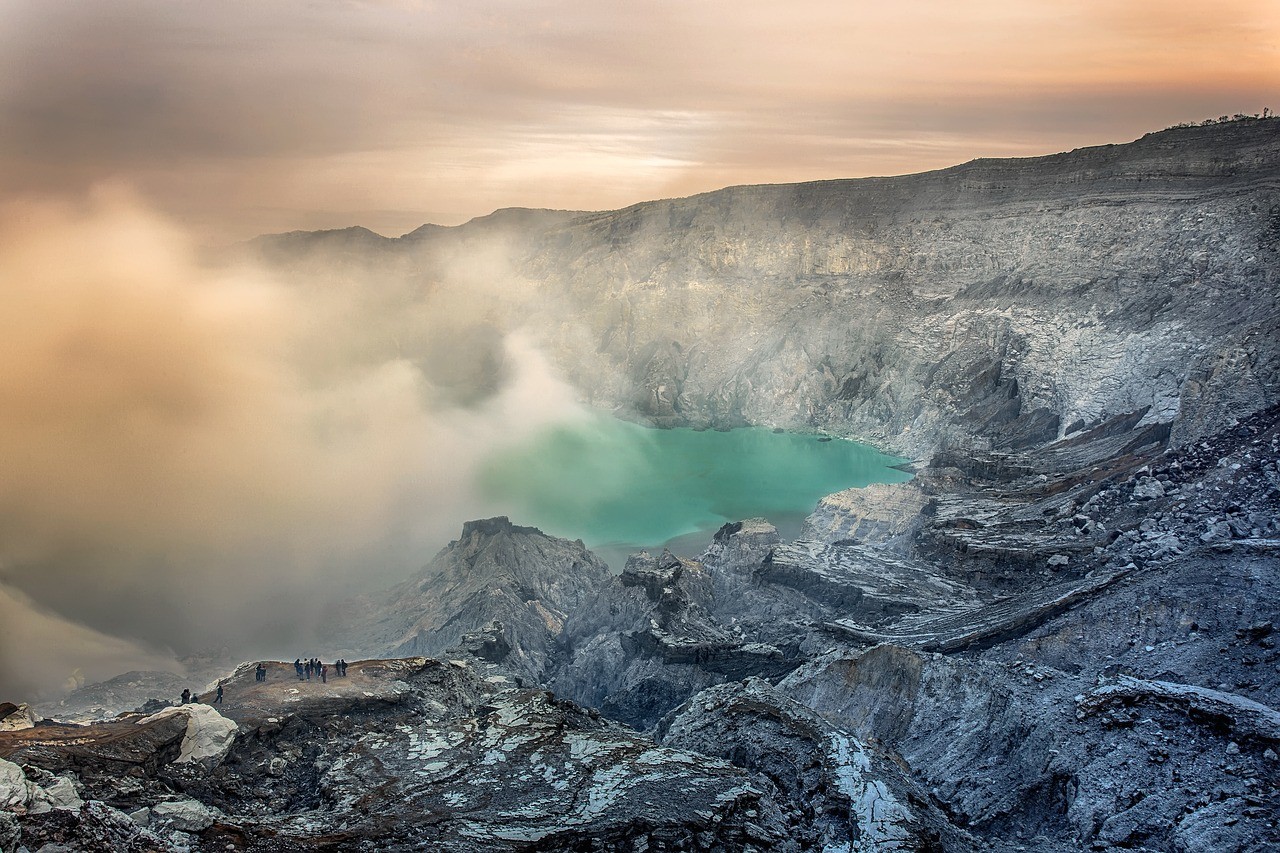
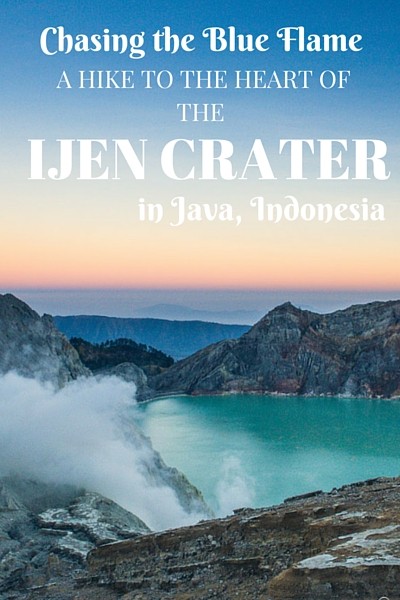

Hmm I guess your guide was more eager to show you the blue flame than keeping you safe. I climbed up a few years ago and it was actually the miners that told me not to descend to the crater, for safety reason.
The miners made me think about what sulphur products I use and whether it was worth it. Anyways, it was an interesting read.
how did you get to Mt Bromo from where you were staying?
We hired a tour guide to take us from Malang to Mt Bromo. Took about 2.5 hours, but we drove at night (left at 1am to get there in time for sunrise) so we missed all the traffic. Would probably take longer if you were to travel during the day.
Did you organize your tour in advance? And did you use the same company to do Mt. Bromo? I’m headed to Indonesia for just two weeks, so I’m trying to figure out the most efficient way to do this without being massively overcharged by booking from abroad.
Hi Carrie,
Yes, we did, but only a few days in advance, when we were already in Indonesia. We reserved via email and paid in cash on the day. We didn’t do Mt Bromo with a tour, instead, we hired a private driver to help us get there and choose to explore on our own. Hope that helps!
Hello!
I’m going to Ijen next week. Reading your blog simply motivated me more to visit the plateau.
I hope I’m coming back with such a great accomplishment and gratefulness 🙂
Glad to hear you enjoyed the post. Safe travels and please be sure you choose a responsible operator for this trip!
Hi,
Great post, thanks for sharing! Did you check how much effect inhaling the sulphur gases for that amount of time really has? I am planning to do that volcano, but I am a bit concerned about the health safety of going down the crater.
Also, you said that before that you did the mount Bromo – how did you move in between those two places and would you be able to write how long each of those took you? Is it crazy to do one straight after another? 😉 We have very limited time in Indonesia, that’s why I’m trying to squeeze everything in the shortest time possible, but I’m not sure what is doable 🙂
Many thanks!
Aga
Hi Aga, apologies for the late reply. I thought i had responded to you earlier, but don’t see my message anymore. So i’ll type it out again.
We didn’t check the impact of sulfur gases, but would definitely not recommend going down there without a gas mask of some sort. Even though you are down there for a short period of time, you will feel the effect of the gasses. You literally won’t be able to breathe without a mask!
As for traveling between the 2 places, we hired a driver to take us to Mt Bromo and drop us off in Banyuwangi the following day. We stayed overnight and set off on our hike to Ijen Crater early in the morning. From there, Blue Flame Tour dropped us off at the ferry docks, where we boarded our ferry to Bali. So it’s definitely doable in 2-3 days, but exausting!
Hi, Thanks for your great information. I will be travelling to Indonesia for about 10 – 12 days with my 62 year old mother and thus would like to do a trip that isnt too hectic.
We will be doing Ubud for 4 days and Yogjakarta for 3 days. In the time remaining i would love to see some Volcanos and if possible take in some beach time and the Komodo dragons ?
What do you recommend ? Do you think Mt Bromo is a good idea ? does it involve trekking, because with my mother i doubt that would be possible.
Are there any particular beaches around the Komodo islands or Flores that you can recommend.
Thanks so much for your help
Hoshner
Mt Bromo is definitely a good idea. Beautiful place and fairly easy to get to from Yogyakarta. There are some nice beaches in Bali, otherwise, Lombok has some good options too. As for Komodo dragons, we honestly dont’ know if you have enough time. You would have to fly to Labuan Bajo (which is pricey) and then go on a day tour to see the dragons and then fly back to either Bali or Lombok the following day. So that’s 3 days just to see the dragons.
Looks amazing! We would love to do this. We spent some time in Yogyakarta but didn’t get to this but want to go back!
Hello, the information is very good and useful
we also have tips for going to mount ijen from bali.
Thank you
Thanks so much for this article! We just arrived in Bali and spotted the Ijen Crater tour online, but I think we’re going to avoid it now after reading this. To be honest I think my main concern is the exploitation of the miners up there – what an awful situation for them to be in! Did you ever find out if money from the tours might feasibly go towards them?!
Unfortunately, I don’t think the tour we went on, or any of the tours provide any support to the miners. They discouraged us from buying the little souvenirs they make, as making those was very bad for their health, but they were not actively contributing anything to better their working conditions. Hope that helps! Enjoy your time in Indonesia!
Mount Ijen and Blue Fire, which are only two in the world, are indeed an attraction for many tourists, both local and foreign. Not knowing the time, visitors who come to this area are always crowded. Friend Traveler plans to visit him too? Because, starting in 2019, Mount Ijen is closed once a day every month.
Great post and you’re right about the blue flames being an anti climax! I went to Ijen a few weeks ago and having done Bromo the previous night I was not fussed about seeing the blue flames. I woke up at a leisurely 7am and took a private transfer to Ijen where I climbed up at my own pace. The path was almost empty as all the blue flame watchers had already left. When I reached the top I got a stunning view of the lake (no sunrise though!) The walk up was also beautiful with such stunning scenery.
I met someone at my hotel who had gone up for the blue flames that morning and saw nothing. I’m happy with the way I did my trip except for the high cost of a private transfer, as everyone wants to put you on a blue flames group tour.
Thanks for sharing your experience, Aditi! It’s good to know that you enjoyed seeing the Ijen Crater during the day as well! It’s not guaranteed to see the Blue Flames at night, so it’s possible to do the hike at night and end up walking away disappointed.
Hi, nice writing about Ijen. I am a local guide in East Java, i live in Malang city near Bromo. I can arange trips and take you around to Ijen, Bromo, Meru Betiri turtle conservation, Tumpak sewu waterfall etc. Just let me know and let me do all the details. contact me trough whatsapp at 081219807325. Anyway, blue fire is eliglible during dry season and its mostly opened since August till now. Cheers…..